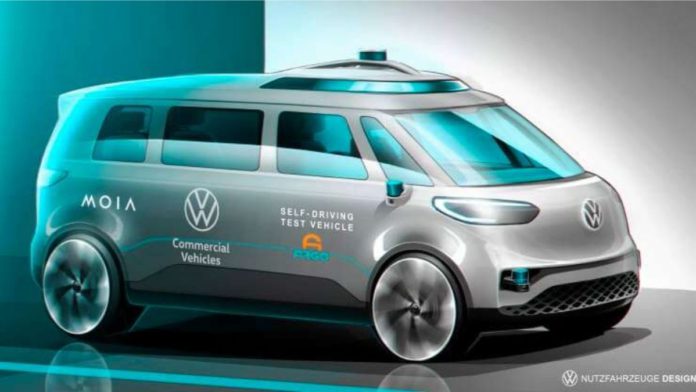Volkswagen has hit another milestone with Argo AI, a Pittsburgh-based autonomous vehicle start-up backed by the German automaker and Ford Motor. On Sunday, they unveiled the first version of the jointly developed, fully-electric self-driving van ID.BUZZ AD (Autonomous Driving). The self-driving ID.BUZZ AD will begin carrying passengers to their destinations in Hamburg in 2025 as part of a ridesharing service offered by MOIA.
Before the start of this week’s IAA auto and mobility expo in Munich, Argo and Volkswagen’s commercial vehicle division presented the first of five ID.BUZZ vans that will be part of a test fleet. At Argo’s R&D center and test track outside Munich, Volkswagen will conduct tests of the battery-powered vehicles equipped with Argo’s laser LIDAR sensors, radar, cameras, and AI-enabled software. The ID.BUZZ models are intended to have Level 4 autonomy, which implies that drivers will not be required to take charge, however the cars would only be able to function in certain situations, such as geofenced regions or predetermined routes. The ID.BUZZ joins the Ford Fusion and Ford Hybrid Escape as the third car platform to be connected with the Argo SDS.
Argo and VW created a prototype minivan earlier this year utilizing VW’s MEB electric vehicle platform inside a VW T6 Transporter and Argo’s AV technologies, including LIDAR sensors, radar, and cameras. Furthermore, Argo’s software allows the car to “see” its environment, plan its future moves, and anticipate the actions of other vehicles and people on the road. When combined with Argo’s sensor suite, autonomous driving at low and high speeds is possible.
Arndt von Bieren, a senior hardware engineering manager at Argo, says, one of the key distinctions of the ID.BUZZ compared to a regular automobile is the roof, which is large and gives a lot of freedom for adding Argo LIDAR and other sensors. “We were able to arrange the cameras and radar in a beautifully formed tiara around the LIDAR in close coordination with Volkswagen.”
Read More: Edinburg Researchers Create New Weather Dataset For Next-Gen Autonomous Vehicles
Boasting a 400-meter sensing range and dark-object identification for safe highway driving, Argo’s state-of-the-art LIDAR sensor is touted to be the industry’s longest-distance sensing range capability. Argo Lidar also has ultra-high resolution perception, which allows for photorealistic imaging of small objects, which is necessary for safe operation on congested city streets.
All this was possible thanks to Argo’s acquisition of Princeton Lightwave, a LIDAR company, four years ago, which allowed the company to develop this new, highly accurate sensor with patented Geiger-mode technology that can detect a single photon, the tiniest of light particles, allowing it to capture, detect, and precisely represent low-reflectivity objects like black vehicles.
The ID.BUZZ will be commercially launched in Hamburg in 2025 as part of a self-driving ride-pool system by MOIA, a VW Group subsidiary that works with cities and local public transportation companies on mobility solutions. The ride-sharing service is intended to use the potential of autonomous systems to alleviate traffic congestion in urban areas. Moia has been running an electric vehicle fleet as part of its “ride-pooling” service in Hamburg since 2017, serving over 3 million clients.


